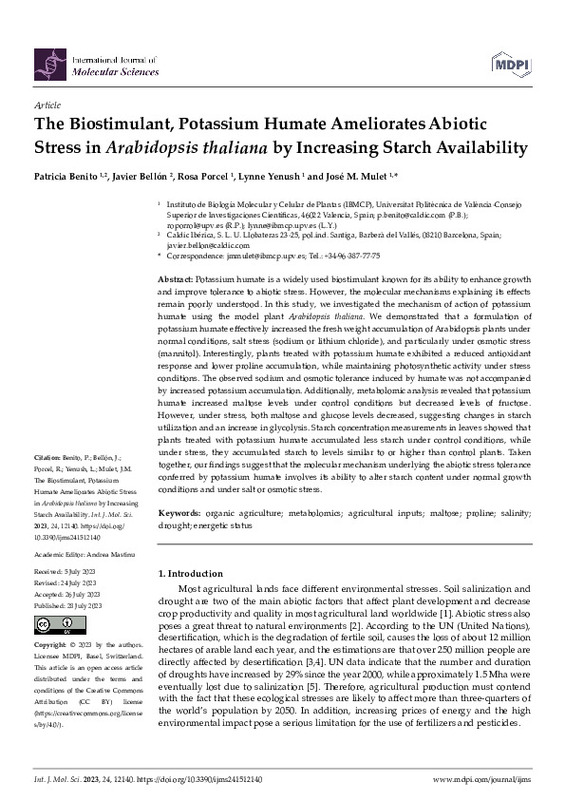JavaScript is disabled for your browser. Some features of this site may not work without it.
Buscar en RiuNet
Listar
Mi cuenta
Estadísticas
Ayuda RiuNet
Admin. UPV
The Biostimulant, Potassium Humate Ameliorates Abiotic Stress in Arabidopsis thaliana by Increasing Starch Availability
Mostrar el registro sencillo del ítem
Ficheros en el ítem
| dc.contributor.author | Benito, Patricia
|
es_ES |
| dc.contributor.author | Bellón, Javier
|
es_ES |
| dc.contributor.author | Porcel, R
|
es_ES |
| dc.contributor.author | Yenush, Lynne
|
es_ES |
| dc.contributor.author | Mulet, José Miguel
|
es_ES |
| dc.date.accessioned | 2024-01-08T19:03:16Z | |
| dc.date.available | 2024-01-08T19:03:16Z | |
| dc.date.issued | 2023-08 | es_ES |
| dc.identifier.uri | http://hdl.handle.net/10251/201628 | |
| dc.description.abstract | [EN] Potassium humate is a widely used biostimulant known for its ability to enhance growth and improve tolerance to abiotic stress. However, the molecular mechanisms explaining its effects remain poorly understood. In this study, we investigated the mechanism of action of potassium humate using the model plant Arabidopsis thaliana. We demonstrated that a formulation of potassium humate effectively increased the fresh weight accumulation of Arabidopsis plants under normal conditions, salt stress (sodium or lithium chloride), and particularly under osmotic stress (mannitol). Interestingly, plants treated with potassium humate exhibited a reduced antioxidant response and lower proline accumulation, while maintaining photosynthetic activity under stress conditions. The observed sodium and osmotic tolerance induced by humate was not accompanied by increased potassium accumulation. Additionally, metabolomic analysis revealed that potassium humate increased maltose levels under control conditions but decreased levels of fructose. However, under stress, both maltose and glucose levels decreased, suggesting changes in starch utilization and an increase in glycolysis. Starch concentration measurements in leaves showed that plants treated with potassium humate accumulated less starch under control conditions, while under stress, they accumulated starch to levels similar to or higher than control plants. Taken together, our findings suggest that the molecular mechanism underlying the abiotic stress tolerance conferred by potassium humate involves its ability to alter starch content under normal growth conditions and under salt or osmotic stress. | es_ES |
| dc.description.sponsorship | This research was funded by the CDTI program project EXP 00137666/IDI-20210456. awarded to CALDIC Ibérica S.L. and the research contract. "DESARROLLO DE FORMULADOS BIOESTIMULANTES Y BIOFERTILIZANTES INNOVADORES DE ORIGEN NATURAL (CALBIO) DESTINADOS A LA AGRICULTURA CONVENCIONAL Y ECOLÓGICA. ESTUDIO CIENTÍFICO DE EFECTOS SINÉRGICOS ENTRE BIOACTIVOS MICROBIANOS Y NO MICROBIANOS" Between CALDIC Ibérica S.L. and Universitat Politècnica de València. The APC was funded by the aforementioned research contract. | es_ES |
| dc.language | Inglés | es_ES |
| dc.publisher | MDPI AG | es_ES |
| dc.relation.ispartof | International Journal of Molecular Sciences | es_ES |
| dc.rights | Reconocimiento (by) | es_ES |
| dc.subject | Organic agriculture | es_ES |
| dc.subject | Metabolomics | es_ES |
| dc.subject | Agricultural inputs | es_ES |
| dc.subject | Maltose | es_ES |
| dc.subject | Proline | es_ES |
| dc.subject | Salinity | es_ES |
| dc.subject | Drought | es_ES |
| dc.subject | Energetic status | es_ES |
| dc.subject.classification | BIOQUIMICA Y BIOLOGIA MOLECULAR | es_ES |
| dc.title | The Biostimulant, Potassium Humate Ameliorates Abiotic Stress in Arabidopsis thaliana by Increasing Starch Availability | es_ES |
| dc.type | Artículo | es_ES |
| dc.identifier.doi | 10.3390/ijms241512140 | es_ES |
| dc.relation.projectID | info:eu-repo/grantAgreement/CDTI//EXP 00137666%2FIDI-20210456/ | es_ES |
| dc.rights.accessRights | Abierto | es_ES |
| dc.contributor.affiliation | Universitat Politècnica de València. Escuela Técnica Superior de Ingeniería Agronómica y del Medio Natural - Escola Tècnica Superior d'Enginyeria Agronòmica i del Medi Natural | es_ES |
| dc.description.bibliographicCitation | Benito, P.; Bellón, J.; Porcel, R.; Yenush, L.; Mulet, JM. (2023). The Biostimulant, Potassium Humate Ameliorates Abiotic Stress in Arabidopsis thaliana by Increasing Starch Availability. International Journal of Molecular Sciences. 24(15):1-21. https://doi.org/10.3390/ijms241512140 | es_ES |
| dc.description.accrualMethod | S | es_ES |
| dc.relation.publisherversion | https://doi.org/10.3390/ijms241512140 | es_ES |
| dc.description.upvformatpinicio | 1 | es_ES |
| dc.description.upvformatpfin | 21 | es_ES |
| dc.type.version | info:eu-repo/semantics/publishedVersion | es_ES |
| dc.description.volume | 24 | es_ES |
| dc.description.issue | 15 | es_ES |
| dc.identifier.eissn | 1422-0067 | es_ES |
| dc.identifier.pmid | 37569516 | es_ES |
| dc.identifier.pmcid | PMC10418871 | es_ES |
| dc.relation.pasarela | S\498107 | es_ES |
| dc.contributor.funder | CALDIC IBERICA, S.L. | es_ES |
| dc.contributor.funder | Universitat Politècnica de València | es_ES |
| dc.contributor.funder | Centro para el Desarrollo Tecnológico Industrial | es_ES |
| dc.subject.ods | 02.- Poner fin al hambre, conseguir la seguridad alimentaria y una mejor nutrición, y promover la agricultura sostenible | es_ES |
| dc.subject.ods | 03.- Garantizar una vida saludable y promover el bienestar para todos y todas en todas las edades | es_ES |
| dc.subject.ods | 06.- Garantizar la disponibilidad y la gestión sostenible del agua y el saneamiento para todos | es_ES |
| dc.subject.ods | 08.- Fomentar el crecimiento económico sostenido, inclusivo y sostenible, el empleo pleno y productivo, y el trabajo decente para todos | es_ES |








